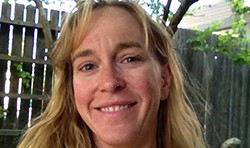 Professors EunMi Cho (above) and Kristen Alexander (below) are working together on a program to put more teachers into the state's strained education system. (Sacramento State file)
Professors EunMi Cho (above) and Kristen Alexander (below) are working together on a program to put more teachers into the state's strained education system. (Sacramento State file)One way to solve California’s teacher shortage? Get well-trained instructors through their degree and credential programs and into classrooms more quickly.
Sacramento State is aiming to do exactly that through two accelerated degree and credential pathways that make up another part of the University’s efforts to solve a critical, statewide shortage of classroom teachers.
Both of the new pathways address subjects and areas in which the state’s teacher shortage is particularly acute. The “Accelerated Child Development BA and Teaching Credentials Pathway,” or ACT, allows students to earn a bachelor’s degree and two credentials – multiple subject and mild/moderate special education – in just 4½ years.
“In California and nationwide, we are lacking teachers, especially mild/moderate special-education teachers, right now,” said EunMi Cho, a professor of special education.

Cho, who with child development Professor Kristen Alexander is coordinating the ACT Pathway, said, “More special-education students are getting a job in mild/moderate special-education classrooms, and that’s where we need more teachers.”
Through the Integrated Teacher Education Pathway, or ITEP, students can obtain a bachelor’s degree in liberal studies as well as multiple-subject and science subject matter teaching credentials in the same amount of time. That makes it an ideal pathway for future teachers who have a passion for science and want to ensure K-8 students develop that same excitement about science subjects, said Pia Wong, associate dean of Education.
The ITEP pathway began after the state Legislature, in response to the teacher shortage, allocated funds to support accelerated programs. Liberal studies was combined with multiple-subject and science credentials because the University had previously offered a blended liberal studies and multiple-subject program, and because of the statewide need for science teachers, Wong said.
Obtaining a degree and two credentials in 4½ years not only saves students money, it also means they are ready to work in the classroom much sooner than if they had followed a traditional degree and credential program, which can take five years or more.
“The workforce needs them right now,” Alexander said. “They won’t even likely need to wait to get jobs.”
To ensure students are able to get through in just nine semesters, the pathways rework the curriculum to be as efficient as possible. The child development major, for example, leaves room for a student to obtain a minor or simply take additional electives. Under the ACT Pathway, those extra course spaces are set aside for credential classes.
A key part of that efficiency is ensuring that students coming to Sacramento State are prepared to enter the pathways quickly. For first-year students, that means getting on either pathway early, so they can apply to the credential programs during the spring of their sophomore year. For transfer students, that means transferring to the University with either an Associate Degree for Transfer in an appropriate field, such as child and adolescent development or early-childhood education, or with all lower-division child development, general education and other prerequisites already complete.
Cho and Alexander have been recruiting students into the ACT pathway, particularly transfer students, and getting the word out at the high school and community college level that these accelerated pathways are a good option for students who know they want to be teachers.
They are also working to recruit a diverse pool of future teachers, part of a critical effort to train a teacher workforce that is more representative of the students they serve. That need is particularly acute in special-education classrooms, where more than half of students are learning English as an additional language.
“We want to have people in these teaching positions who can be impactful for the diverse student populations they will be serving,” Alexander said. “We’re focusing on recruiting a diverse student population so they can better reach their students.”
Cho and Alexander say they hope to eventually expand the ACT Pathway to offer an option for either a moderate/severe special-education credential or an early-childhood special-education credential.
The ACT Pathway is funded through a grant from the College Futures Foundation.
For more information about either pathway, visit the College of Education website. – Jonathan Morales
